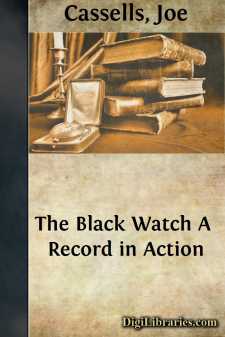Categories
- Antiques & Collectibles 13
- Architecture 36
- Art 48
- Bibles 22
- Biography & Autobiography 813
- Body, Mind & Spirit 142
- Business & Economics 28
- Children's Books 17
- Children's Fiction 14
- Computers 4
- Cooking 94
- Crafts & Hobbies 4
- Drama 346
- Education 46
- Family & Relationships 57
- Fiction 11829
- Games 19
- Gardening 17
- Health & Fitness 34
- History 1377
- House & Home 1
- Humor 147
- Juvenile Fiction 1873
- Juvenile Nonfiction 202
- Language Arts & Disciplines 88
- Law 16
- Literary Collections 686
- Literary Criticism 179
- Mathematics 13
- Medical 41
- Music 40
- Nature 179
- Non-Classifiable 1768
- Performing Arts 7
- Periodicals 1453
- Philosophy 64
- Photography 2
- Poetry 896
- Political Science 203
- Psychology 42
- Reference 154
- Religion 513
- Science 126
- Self-Help 84
- Social Science 81
- Sports & Recreation 34
- Study Aids 3
- Technology & Engineering 59
- Transportation 23
- Travel 463
- True Crime 29
The Black Watch A Record in Action
by: Joe Cassells
Categories:
Description:
Excerpt
CHAPTER ONE
For more than two years now, I have been trying to forget those first months of the war. The months when the Black Watch and other regiments of the immortal “contemptible little army” marched into the unknown against the fiercest, most efficient military power the world, up to that time, had known; the months when hidden enemies struck swiftly mystifying blows with strange weapons, the more terrible because we did not understand them and had never imagined their power and numbers.
For more than two years I have habitually sought to keep my mind upon other subjects, yet I can recall those days now in the minutest detail. I can hear the sudden thrum of the masked machine guns like giant partridges drumming; can hear the singing roar of the Prussian airplanes to which, in those days, because of the scarcity of British planes, there could be practically no answer; and I can live again the frightful nights when we made our stand upon the Marne, and, sneaking into German outpost trenches, slew the guards with jack-knives, thrusting gags into their mouths and cutting their throats to prevent outcry.
Those were the days of picturesque and shifty fighting. There was movement, the rush of cannon from the rear, the charges of cavalry, the perils of scouting and patrolling. It was little like the slow trench warfare which followed.
The Black Watch—the regiment to which I belong—was one of the first to cross the Channel. War was declared August 4th, which was Tuesday. The first-class reservists, of which I was one, received their mobilization orders the next day.
We assembled at Queens Barracks, Perth, the historic headquarters of what we proudly maintain is the world’s most famous fighting organization. Twice before, since 1742, the Black Watch had outfitted in Perth to fight in Flanders. Almost constantly since that date, battalions of the regiment have been fighting for Britain in some far-off quarter of the globe. For the third adventure in Flanders, which was to see the existing personnel of the regiment practically wiped out in an imperatively necessary campaign of blood sacrifice, our preparations were brisk and businesslike. Within three hours of my arrival at the depot at Perth, I was one of a thousand men, uniformed, armed, and fully equipped, who entrained for Aldershot to join our first battalion stationed there.
On the thirteenth of August, after a week’s stiff training, we boarded the steamship Italian Prince and the next day disembarked at Havre.
What awaited us there was much like the reception later given to the first American troops to land in France. What followed was quite different. The American troops, and millions of their friends and relatives, are all wondering what awaits them—what war really will be like—what they will have to do and the conditions under which they will do it.
It is an axiom of war that the first troops almost invariably suffer the greatest losses. The first American units to go into the trenches have suffered a low average of casualties....


